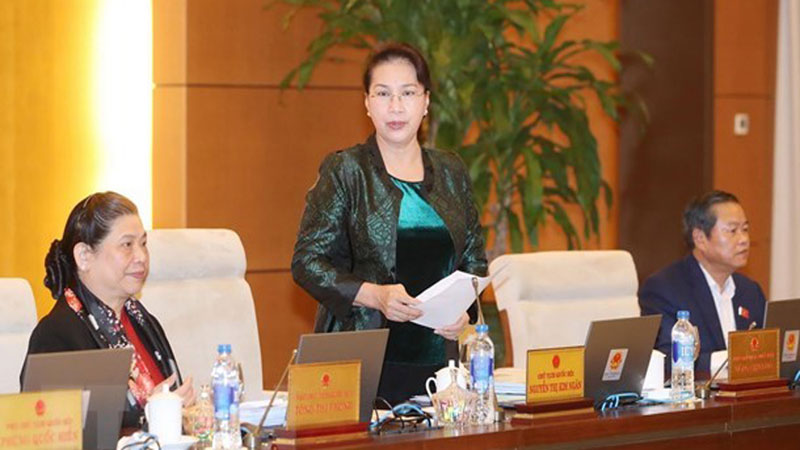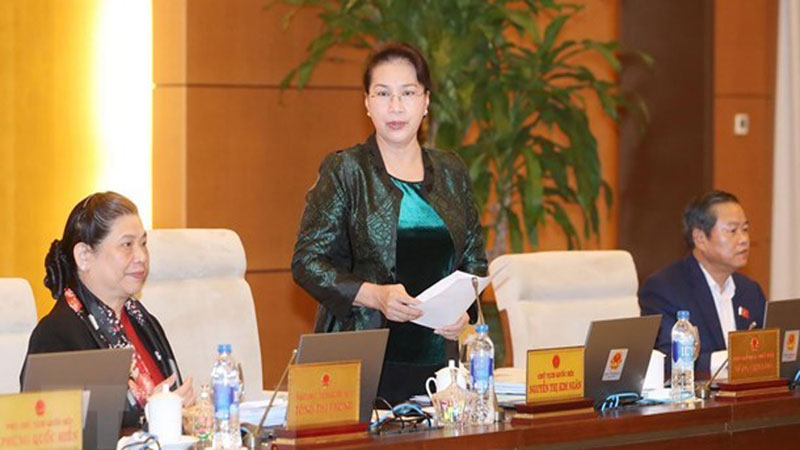
The National Assembly (NA) Standing Committee wrapped up its 32nd session in Hanoi on March 13 under the chair of NA Chairwoman Nguyen Thi Kim Ngan.
Speaking at the closing session, Chairwoman Ngan asked the Government, permanent members of the NA Ethnic Council and committees, the State Audit Office of Vietnam, and other relevant agencies to collect feedback to refine five draft laws and one draft resolution for submission to the NA Standing Committee at its session in April 2019, as well as to complete four draft resolutions for signing.
 NA Chairwoman Nguyen Thi Kim Ngan speaks at the session.
NA Chairwoman Nguyen Thi Kim Ngan speaks at the session.
She said the upcoming session from April 10-19 will discuss a number of contents and as
such the collection of feedback on several draft laws is very urgent.In the afternoon of the same day, the NA Standing Committee gave opinions on the draft resolution on the settlement of tax arrears and fine payments.
In accordance with the Law on Tax Management and documents on amendments and supplements to it, the Ministry of Finance set up units in charge of tax arrears management and coercion from the central to local levels.
The collection of tax arrears has increased over the years, reaching 81
percent of the total from 2011-2017. The ratio of debt to domestic state revenue fell from 12.2
percent in 2014 to 7.6
percent in 2017, and down to 7
percent in 2018.
As of December 31, 2017, total tax arrears topped 78.47 trillion VND (3.4 billion USD), down 2.8
percent from the previous year.
Lawmakers shared the view that the removal of tax and fine debts need to be taken in a cautious and serious manner in line with the law.
They agreed that after the amended Law on Tax Management was adopted by the NA’s seventh session, the Government should collect opinions during the 32nd session to refine the draft resolution to submit to the legislature at its eighth session.
The NA Standing Committee also adopted a resolution regulating the military ranks of lieutenant general and major general, which have yet to be set specifically in the 2018 Law on People’s Public Security Forces.
In the spirit of "Party members go first, the people follow”, all households of Party members in the Doan Ket sub-region in Da Bac town, Da Bac district, voluntarily removed gates and fences, and donated land when the road expansion project passed through their properties. Inspired by their example, 68 households in the sub-region quickly followed suit, contributing over 1,400 sq.m of residential and perennial cropland to widen the main road through the residential area. The exemplary role of Party members in Doan Ket stands as a shining example of studying and following President Ho Chi Minh’s thought, morality, and lifestyle.
The Hoa Binh provincial People's Committee held a monthly meeting on May 29 to assess the implementation of socio-economic development tasks in the first six months of 2025, the progress of key projects, and some other important issues.
During his lifetime, President Ho Chi Minh always expressed his deep affection and special concern for children and youth. He once emphasized: "Caring for and educating children well is the responsibility of the entire Party and the entire people”; "First of all, the family (i.e. grandparents, parents, siblings) must do this job well”. "the Party Committees…, the Children’s Committee, the Youth Union, the education sector, and all related organizations must have specific plans to ensure children grow healthier and more progressive”. His teachings has been remaining valuable and serving as the guiding principles in the work of protecting, caring for, and educating children. In line with this ideology, Hoa Binh Province has continuously been prioritizing and investing resources in the well-being of children in recent years.
Mr. Nguyen Phi Long, the alternate Member of the Party Central Committee and Secretary of the Provincial Party Committee chaired the meeting of the Standing Committee of the Provincial Party Committee to provide opinions on several investment projects within the province. There was the attendance of Ms. Bui Thi Minh, the Permanent Deputy Secretary of the Provincial Party Committee and Chairwoman of the Provincial People’s Council; Mr. Bui Đuc Hinh, the Deputy Secretary of the Provincial Party Committee and Chairman of the Provincial People’s Committee and other members of the Standing Committee; the leaders from other departments, agencies, and some localities.
The Standing Board of the Vietnam Fatherland Front (VFF) Committee of Hoa Binh province held a meeting on May 28 to honour outstanding village elders, village heads, and reputable individuals from local ethnic minority and religious communities.
In mid-May, the provincial Museum organised an exhibition named "Duoi la co Dang Cong san Viet Nam quang vinh” (Under the flag of the glorious Communist Party of Vietnam). This meaningful activity took place in the joyful atmosphere to celebrate the country's major holidays and the Party congresses at all levels for the 2025-2030 term, towards the 14th National Party Congress.



 NA Chairwoman Nguyen Thi Kim Ngan speaks at the session.
NA Chairwoman Nguyen Thi Kim Ngan speaks at the session.